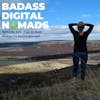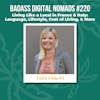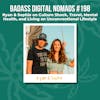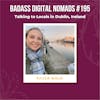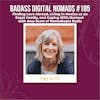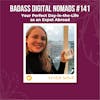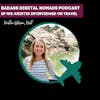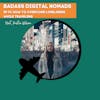How To Find Your Home and Your Community Abroad (World Towning Part 2)

Curious to know what it's like to leave behind the American Dream and live a nomadic lifestyle? In part 2 of this interview, Will and Jessica talk about their approach to long-term global travel, from staying on top of healthcare and making new friends to letting their kids pick which countries they go to.
Status-quo dropouts and creators of WorldTowning, Jessica and Will Sueiro are avid adventurers who have been traveling the world with their free-spirited children, Avalon and Largo, since 2014. Together, they’ve visited 70 countries in their quest to provide their children with a global education, while building a deeper bond as a family. WorldTowning is a company committed to helping individuals broaden their global experiences through coaching, immersive group expeditions, and sharing their entire journey on their YouTube channel.
In part 2 of this interview, Will and Jessica talk about their approach to long-term global travel, from staying on top of healthcare to letting their kids pick which countries they go to. You’ll gain insight into the challenges and uncertainty of leaving behind the American Dream, the mindset required to live a nomadic lifestyle, and why parents shouldn’t wait until their kids are grown up to travel. Plus, you’ll learn what it really means to “live like a local.”
Creating content, raising a family, and traveling to multiple new countries every year takes a lot of work. It isn’t easy by any means, but this family is learning to love every minute of it!
A WorldTowner is someone who is living and changing the world through travel – one hometown at a time.
Tune in for lots of long-term travel tips from experts Kristin, Jessica, and Will!
"You don't have to accept 'good enough' when life can be really great." - Will Sueiro, World Towning
"I think that travel is never wasted on anyone at any age. To go out and take your kids with you has been the greatest gift." - Jessica Sueiro
Traveling soon? Make sure you have international travel or health insurance and an online bank account before you go.
EPISODE 131 TOPICS DISCUSSED:
- How to make your escape plan of leaving home to travel the world and work backwards.
- The cost of travel medical and health insurance abroad.
- Living in Costa Rica versus Ecuador.
- Traveling as a family and meeting people along the way.
- Bonding with your family and others through travel.
- The shocking event that delayed Will and Jessica’s initial dream of moving abroad.
- Transitioning from corporate life in America to traveling the world.
- What it's like to live in Costa Rica as a family of expats.
- Why they like Morocco so much and how to attend a travel retreat there.
- Creating boundaries with work and staying in the present moment while traveling.
- How their children have adjusted to a nomadic lifestyle.
- Cultivating freedom of choice and compromise while traveling with family and being on YouTube.
- Surviving COVID lockdowns on a sailboat.
- Advice for parents waiting for their kids to become adults before they travel.
- Traveling with WiFi tips.
- Favorite countries in Europe.
QUESTIONS ANSWERED:
- What was your life like before becoming full-time travelers?
- Why did you leave behind a secure life in America to travel the world with your kids?
- What international health insurance do you use as digital nomads?
- Why did you choose to move to and leave Costa Rica?
- What is World Towning?
- How do your kids deal with growing up on YouTube?
- Will your kids go to a traditional university?
- Why should parents travel with their kids before they graduate high school?
- What does it mean to live like a local when you’re a foreigner?
- What travel destination did you surprisingly love?
- What travel destination is overrated?
- How do you access the internet while traveling?
- And much more!
RESOURCES
Do you want help moving abroad? Join the waiting list for Kristin's signature relocation program, Ready to Relocate.
Request a podcast or video topic here.
Videos:
- 8 Reasons Why Americans LEAVE Costa Rica [Why I Left]
- How I See the US After Living Abroad for 15 Years [CULTURE SHOCK]
- Why I’ll NEVER Renounce My US Citizenship
Related Podcasts:
- The Great Resignation
- Moving Abroad with Kids (Greenback Tax Founders)
- Sailing the World with Sailing Ruby Rose
- Sailing Family Leaves Australia for Europe
- Inside the Real Bangkok, Thailand with Erick Prince, The Minority Nomad (Part 1)
- Inside the Real Bangkok, Thailand with Erick Prince, The Minority Nomad (Part 2)
- 7 Reasons Why I’ll Never Renounce My US Citizenship
International Health and Travel Insurance:
International Internet Access:
Connect with Jessica & Will:
- Subscribe to their YouTube channel
- Follow them on Instagram
- Connect with them on Facebook
...........................................................................................
Connect with Kristin:
- Follow on Instagram
- Subscribe to Traveling with Kristin on YouTube
- Subscribe to Digital Nomad TV on YouTube
- Follow on Medium
- Follow on Clubhouse @KristinWilson
- Join the Badass Digital Nomads Facebook Group
...........................................................................................
Support the Badass Digital Nomads Podcast:
...........................................................................................
Thank you to our Traveling with Kristin/Badass Digital Nomads 2021 Patrons: Teklordz, Walt, Shawn, Richard Y, RZ, Craig S, Colin, Heather, Karen, Kiran, Scott, Michael and Annie, Issac, Mike M, Yasmine, Erick M, Yohji, Gary R , Ron, Gary, Ray, Henry L, Kelly, Alejandra, Keith, Stephen, Henry M, Warren, James, Daniel, Javier, Gary B, Emily, Rich, Aisha, Phil, Anthony, Anna, Jennifer, Kathleen, Natalie, Dave, Brian, Christopher, CJ, David, Mike, Kathleen, and Chip.
Special welcome to our newest Patrons from October 2021: Jeffrey, Paulo, and Stephen
❤️ Become a Patron for $5/month at Patreon.com/travelingwithkristin
Thank you to Iroc and Isis for the Apple Podcast Reviews! Leave a review for Badass Digital Nomads here.
...........................................................................................
Podcast descriptions may contain affiliate links of products and services we use and recommend at no additional cost to you.
Sneak Peek:
Will Sueiro: 00:00:00 Until you go out there and you talk with someone who lives there on the ground and is sharing their story and you're, you're actually having these conversations that you'll have only have when you're in a place for long enough time to develop a relationship, that they're willing to go ahead and be this passionate about sort of educating you about your own country. And, and sometimes you have to travel around the world to be happy with what you have in your own world. You don't, you don't get that being where you're at at the moment. We've been
Jessica Sueiro: 00:00:25 Schooled and enlightened a lot as we've traveled. Yeah. Um, and it's made, the United States is by no means a perfect country, but that moment in time really made us look at things differently and approach things differently.
Introduction: Welcome to Badass Digital Nomads, where we're pushing the boundaries of remote work and travel, all while staying grounded with a little bit of old school philosophy, self-development, and business advice from our guests.
Kristin Wilson, Host: 00:00:56 Hello. Hello. Good day to you, wherever you are in the world today. Kristin, from Traveling with Kristin here and welcome to episode 131 of Badass Digital Nomads. Today is the second half of a two part interview with world Travelers and YouTubers, Jessica and Will of World Towning. So in case you missed last week's episode, definitely go back and check that out. But you can also enjoy this episode on its own because we're talking about a whole new set of topics. In today's show, Jessica and Will share about what they've learned about American culture and being US citizens after moving abroad and what the, uh, locals that they met in other countries actually think about the US. They also explained how they decided to choose Costa Rica as their first destination to move to when they went abroad, but then what they didn't necessarily like about it and how things didn't turn out as expected, and why they then decided to leave Costa Rica for Ecuador.
Kristin: 00:02:11 So we're kind of comparing and contrasting their experiences there, the cost of living, the lifestyle, the locals. And then they're also sharing some of the other mistakes and lessons that they've learned in their first seven years of full-time travel. They also share about what it's been like traveling the world and documenting it on YouTube as a family of four. And kind of how to figure out when is the best time for you to go abroad? Should you leave now? Should you wait until your kids are grown up? Should you wait until you're retired? What are some of the pros and cons and trade-offs of traveling early versus later? So definitely lots to think about there in your own life. And then in the lightning round at the end, they share their favorite and least favorite or most overrated countries that they've been to in Europe after traveling to every single country in Europe.
Kristin: 00:03:11 They also give their tips on finding Wi-Fi overseas, budget versus luxury travel and why they keep going back to Morocco. And before we get into it, I would just like to say thank you to my newest patrons from October, Jeffrey Long, Paulo Bento, and Steven Weeks. You can become a patron for only $5 per month over at patreon.com/travelingwithKristin. Also, thank you to ISIS and IROC from the United States who both left reviews last week on Apple Podcasts. ISIS says, quote, you set me free Kristin just happened to come across your podcast this minute, and you have blown my world away. I've been struggling lately at every level, but especially from working with a toxic boss, I felt paralyzed and unsure of what to do next and where to go. But in listening to you, you opened up a whole new world of possibilities. I've always considered myself a gypsy, but have always lived a very non gypsy life.
Kristin: 00:04:18 You have shown me the way a million things. Thank you, Isis, for leaving your kind words and sharing your experience. I feel like a lot of you guys can probably relate to feeling like you have a more nomadic and adventurous soul than perhaps your lifestyle has provided for in the past. And that could be one of the reasons that you listen to the show. If you've been struggling with a quote toxic boss or toxic job like ISIS says, then check out my podcast on the Great resignation. You can just go to badassdigitalnomads.com and search for it in the search bar. A few people have said that they listened to it multiple times to get that motivation for leaving a toxic work environment. And also thanks to IROC who says This review is passed due. This show continues to stay engaging in a genre where things can easily become redundant.
Kristin: 00:05:14 Kristin, as a host, allows for the guests and topics to develop naturally while still maintaining a general theme throughout to deliver value. Thank you, IROC. I do try very hard to keep the topics fresh and also with a diverse range of guests. I am really excited for the lineup of guests that we have for 2022. And you can also search for any topics or search by tags over on the Badass Digital Nomads website. I'll also drop a link in the show notes if you would like to request a video or podcast topic, without further ado, on with part two of my conversation with World Town. So I love the way, like how this conversation has gone, but I wanna give people some background information on how, you know, how you got here after seven years. So can you bring us back to what your life was like before you made that decision to move and why you wanted to leave your white picket fence life, and then why you decided to go to Costa Rica first?
Will: 00:06:24 This was, this was a long time in the making.
Jessica: 00:06:26 Yeah. We're not an overnight success.
Will: 00:06:28 Right? Right. It's not like there was, there was a, a moment was like, that's it. I'm selling it all. We're, I'm outta here. You know, our, our–our journey started off when we were living in Los Angeles like seven years beforehand. And, and we had the opportunity through the accounting firm I was working at, to, to move to a foreign country as a, as a secondment. So I was gonna be sort of lent from the US firm to the Spanish firm 'cause they were considering moving us to –to, to Madrid. And, and it was gonna be like an all expenses paid expat position. The kids schooling paid for it. It was, you know, it was, it was one of those things that you'd be like, how can you dare say no? Yeah. And you know, we, we, we always had like the travel bug in us, but it was, it was one of those things that, you know, we'd do it on vacation and we didn't really talk at all in the slightest about what would be like to live full-time someplace else.
Jessica: 00:07:21 And then you came home one day and said, would you consider doing this as an expat package? And I said, sure. When do we leave? Like, it was literally a 32nd conversation.
Will: 00:07:30 Right. And, and we were, we were, we already signed on the dotted line and they took us over to, to Madrid to go ahead and pick out an apartment and meet with, you know, the people I would be working with. And she, Jessica was pregnant with, with our second child at that moment.
Jessica: 00:07:46 And we didn't tell them that before. The people in his office knew. I don't, I don't, I never thought it would even be relevant that I was pregnant.
Kristin: 00:07:53 Right, right.
Jessica: 00:07:54 I already had one kid, you know, we were willing to go, but that was a big issue.
Will: 00:07:57 So they didn't want us to be there while she was, it, it turned into like a visa issue because they didn't want her visa not to be approved yet her be in place in, in, in Madrid, even though she could have been on a tourist visa. Um..
Jessica: 00:08:13 because they, because they had been burned by another person, American who had been pregnant there, had the babies skipped out on the contract and went back to the US because they couldn't deal.
Kristin: 00:08:23 Because FYI, a lot of, a lot of couples break up and get divorced when they go abroad. Yeah. And I don't know what the statistics are, but I know from anecdotal experience, and a lot of those expat assignments fail because of the spouse's inability to integrate because they usually don't get any support and they don't have any purpose of being there. They're usually not working, they're just waiting around.
Jessica: 00:08:48 You just spoke a hundred percent truth.
Will: 00:08:49 Right. They never said that. Absolutely. Okay. But that's what I found out after the fact. Yeah. And when they, when they, when they rescinded the offer or they said no,
Jessica: 00:08:56 They said you could go without me.
Will: 00:08:57 They said, I can go without her and then she has to give birth to our son sort of without me there.
Jessica: 00:09:03 Mind you, at the time I had a three-year-old, I had a business and I was pregnant and they wanted him to go without me and then come back oh. Two weeks before the birth. So who knows if I would've had the baby earlier any complication. So managing all of this by myself and a business at the end of the pregnancy,
Kristin: 00:09:20 That's such an American company mindset. Like, whereas other countries will give you paternity leave and the US is like, oh, you get two weeks before, just come be there for the birth, pop the kid out, and then go back to the other side of the ocean. Like, what?
Jessica: 00:09:34 But it was a Spanish company
Will: 00:09:35 Right. In well in all, in all Spanish. In all fairness, in all fairness to, to the US firm, the way these firms are set up, like each country is its own individual unit and they all belong to like a franchise type thing. I worked for a large, like a, a big five accounting firm. And like the, the Spanish firm is independent from the American firm, although they carry the same name. And so the, the legal department in Spain was fighting their case, why they did not want her to be there. And the legal department in the US was saying, what on earth are you talking about? This, what you're saying has no, has no precedent
Jessica: 00:10:07 because in the US we think a woman can work and give birth and be back at work the next day.
Kristin: That's true.
Jessica: So they're like, why would there be an issue, so,
Will: 00:10:13 You know, that's true. <laugh>, I think, I think at the end, at the end, there's nothing that the US firm could have done to change the Spanish firm's mind to sort of allow this to, well
Jessica: 00:10:21 They had just been burned like six months before.
Will: 00:10:23 Right and so there was, there was, there were hiding in a loophole that was not really there. Long story short, I'm at the firm, I give my notice because I I've had enough,
Jessica: 00:10:33 he was pissed at that point.
Will: 00:10:33 And then, and then I'm at a, a company function that there was people from all over the country at. And then I find some guy just by, by random chance. And he said, oh yeah, I was in Madrid and I was there with my wife and she got scared and we left. And I'm like, oh, so it's you.
Jessica: 00:10:51 And was like, so you're the dick.
Kristin: 00:10:52 It's his fault. <laugh>.
Will: 00:10:53 Yeah.
Jessica: 00:10:54 You're the one who screwed my magic.
Will: 00:10:55 So you're the guy <laugh>. And, and then I just like, you know, I, I just like said, oh, that's nice to meet you
Jessica: 00:11:01 Anyway. Let's get to the good stuff.
Will: 00:11:02 And so, and so at the end of the day that, that dream of going overseas died at that moment. And so we decided to pack things up in, in Los Angeles. We moved to Boston and thought, okay, we're gonna start brand new. We're gonna buy a house. We're gonna sort of live closer to family. We're,
Jessica: 00:11:18 We're gonna buy a house we're gonna live in for the rest of our lives.
Will: 00:11:21 That was the idea
Jessica: 00:11:22 In a nice suburb, even though neither one of us are raised in a suburb, but that's what good parents do. Right. They put their kid in a suburb.
Kristin: 00:11:29 So you went, put your kids in private school and how long did you live in Boston for?
Jessica: 00:11:33 No, we didn't initially put 'em in private school. We moved to a suburb of, uh, seven miles south of Boston. And then they were still little, so they were in preschool, then they went to the public school there for a year and then we transferred. Then another will started saying, let's entertain going abroad again through the company. And something came up, it fell through, something came up up, it fell through. Something came up and they said, it's probably gonna be about six months. So then we said, alright, let's get our act together. So we sold a lot of our stuff rented at our house, moved into a a month to month apartment in Boston. At that point, we had already transferred the kids to the international school there anyway. 'cause we were unhappy with some things that were happening in the local school system. And we waited the six months, the year, the year and a half, the two years. And then
Will: 00:12:18 We, we were, we're tired of having the carrot dangled in front of us saying, no.
Jessica: 00:12:22 And the kids are getting older.
Will: 00:12:22 Wait, it will happen. It will happen. Don't worry. It's coming. And we just, we just got tired of waiting. Well,
Jessica: 00:12:27 We thought we, we realized that there's gonna be a point where our kids were not excited about going. Now as far as they knew in life, everyone did this. Everyone went and lived in another country. 'cause that's all we had been saying since our son was born. Oh. 'cause we were gonna go, gonna go, gonna go, gonna do something. Finally we said, okay, it's never gonna happen with the company. Let's just come to the conclusion. Even though they say it's gonna keep happening. And some of it was beyond their control. And so I said to Will, why don't, since I have a business, I work from home, why don't I take the kids to Paris for the summer? And that will be the compromise. We won't go live in another country for two years, but we'll go for a summer. And he is like, well, how are you gonna work and do the kids? 'cause in the summer I had, I had help or they would go to my parents for a week, then they'd go to golf camp so that I could work.
Kristin: 00:13:08 And where did you work?
Jessica: 00:13:10 I worked from home. I had a graphic design business. Okay. So he said, how are you gonna do that? And I said, I don't care. I'm gonna figure it out. This is something we really want. He said, well, I wanna come too, but there's no way I can come with the company. So why don't you go, you know, why don't you go? It was, it was a little bit different than that. Basically. I said, I wanna go. He being the accountant said, we can't afford it. I said, you're challenging me, I'm gonna afford it. So then I rented our apartment out on Airbnb for most of the summer to pay for it. And then he was like, where am I gonna sleep? I'm like, you're gonna, maybe you could sleep at a friend's house. And then he was like, well, I wanna go too. So then he went to his company and said the situation and said, I wanna take a three week vacation in the middle. And normally they don't let him take even three weeks at a time. You know, it's have to be taken individually. And they, long story short, they said, why don't you work from the Paris office. For the summer. And basically what happened was we had, it was, it was a wonderful but also awful summer in many ways. A lot of things went wrong. We had a really bad apartment. The toilet was always broken. Our daughter ended up being hospitalized with severe mono.
Kristin: Oh my gosh.
Jessica: But we came back and we said,
Will: 00:14:13 It wasn't that bad <laugh>. It was, you know, you, you never remember the bad parts. And, and at the end of the day, you know, we, we started to realize that the kids were, were flourishing. You know, they were, they were adapting. They were our translators the entire time because they were in a French immersion program in, in, in a public school system. And
Kristin: 00:14:33 Do your kids speak French and Spanish? Yeah. Yeah,
Jessica: 00:14:35 They do.
Will: 00:14:35 Yeah, they do. Okay. And, and so they, you know, we just saw like, it clicked and, and we didn't care about sort of our, our daughter being hospitalized. We didn't <laugh> we did. No, no, no. But in terms of like, you know, being scared about it 'cause 'cause it just happened
Jessica: 00:14:51 . No, we weren't scared. We've never been
Will: 00:14:52 Because the hospital care was
Jessica: 00:14:53 Fantastic. We've never been scared of medical outside the us We've always had really good experiences. Right. So we came back from Paris and we were like, okay, if it happens with a company, what if it's two years from now, our eldest was nine and we're like, maybe by 11 she's not gonna wanna go. Maybe by 11 she's gonna have a set group of friends and be, this is going to be her normal and this kind of travel thing isn't gonna interest her at all.
Kristin: 00:15:15 Yeah. The adolescent years where kids get fixed. Yeah.
Jessica: 00:15:18 And it's, it is tough to take a kid in the adolescent years when it's not part of their normal and they've just done a vacation here and there. And we've seen it happen with a lot of people. There are success stories for sure. And there are not success stories. It's much easier to go with them if I, I would say depending on the child, but a 10 and under to kind of start a lifestyle change. Um, and so we decided we're gonna give ourselves 12 months. We're gonna sell everything. We're gonna figure out how to do medical insurance. We're gonna figure out how to homeschool, we're gonna figure out visas. And we left 13 months later. So it, it worked, you know, it really, it worked out. I mean, the plan, you know, the plan, the initial plan was a two year expat package. Then it became, well, we'll compromise and just maybe do summers.
Jessica: 00:15:59 And that, you know, that was almost seven years ago. So when we started, you know, our life to go to Costa Rica, Will and I did everything in our planning process as if we were going and never coming back. Okay, we're gonna go, I mean, we'd come back for visits, but we really wanted to make this a lifestyle change. But as you know, when you're first starting out, we thought we wanted to make this a lifestyle change. But now seven years in, we really didn't know what we were getting into you know, but we, we, there were parts of us that thought, well, maybe we won't like it or kids won't like it. But we planned and behaved as if it was forever. And that was, I think, a really good thing because we, we had a mindset that we're gonna make this work because we truly, even though we don't have the experience and we don't know what it's like, we believe it's the right thing.
Will: 00:16:42 Plus when you sell these things for like pennies on a dollar, the last thing you wanna do is come back and buy it all back and
Kristin: 00:16:48 Exactly. So what, just quick question on healthcare, 'cause people always ask, what are you doing for your international health insurance right now for your family? Are you paying any US at all or do you just have an international catastrophic plan? Or what's your setup?
Jessica: 00:17:05 Do you wanna talk about the plan?
Will: 00:17:06 We use, uh, IMG global. Okay. And it covers us in the US but we can't be in the US year round.
Kristin: 00:17:14 Is it like a 30 day limit or something like that?
Will: 00:17:16 It's a six month limit actually. So it's Oh, that's good. Yeah, it's pretty good. And then we can always sort of get a supplemental if we have to stay longer.
Kristin: 00:17:23 Is it less than the US, I guess ACA?
Will: 00:17:27 We pay about four grand a year for the four of us.
Jessica: 00:17:31 But it, it's a huge deductible. So we have a 5,000, you can choose your deductible, but we have a $5,000 deductible, which means basically every year we're paying, you know, I would say on average, depending if it's a healthy year. I mean one year I had to have, have surgery on my spine, so we ate up the whole 5,000 we had to pay out. But I would say on average, it's what, 500 a year you think?
Will: 00:17:56 around there
Jessica: 00:17:56 That we pay out of pocket. 'cause we have to pay out of the insurance is really to cover us for anything serious or like, you know, um, something chronic cancer, some major broken bones hospitalizations that have a bill that extend over five grand. So we pay all outta off our office visits. Um, you know, my annual female visits, that kind of stuff out of pocket. But it's, it's
Will: 00:18:17 Like dental cleanings and stuff like that. We pay for it.
Jessica: 00:18:19 It's considerably less than what it would be in the us. We almost see ourselves as not having insurance because we have a $5,000 deductible. So it's there to protect us and our children for anything that's serious. But anything that's routine stuff, we pay out of pocket. And we've had that same insurance for our entire seven years of traveling. But we had a lower deductible when we first started out.
Kristin: 00:18:40 I did the same thing. I would just pay out of pocket, like $30 here, $50 here for a consultation or a checkup or whatever. And even if I had to get an x-ray or something, like, it usually wasn't that much. But if it was anything more than a few hundred dollars, I would go and make a claim with my insurance. But if it was, you know, a dental cleaning in Thailand or Bulgaria or something, I would just pay for it out of pocket and go about my life. So. Okay. Well that's,
Jessica: 00:19:08 People don't understand how, how inexpensive it's, I've had, because I have spine issues, I've had MRIs in probably five or six different countries and they range from a hundred to 150 US dollars. I've had CT scans, which are about how much are the CT scans?
Will: About the same.
Jessica: About the same. I mean, I don't, I think there are hundreds if not thousands of dollars in the us. I don't know. I never did not, I didn't, I never paid out of pocket in the US 'cause I always had insurance with like a, you know, a $20 or $30 co-pay. Yeah. But I, we've been very pleased with the medical care. We haven't had, we've had, and we've had a lot of different things done over the years, you know, and, and, and we've just been very pleased with any care that we've gotten.
Kristin: 00:19:48 Okay. Awesome. Well, I am curious about your time in Costa Rica because I also have a video that's about why I left Costa Rica. And it kind of lists all of the things that causes foreigners to leave <laugh>. And I know that you have this idea of doing a year in each place, and you've done, you've learned how to sail, you've spent a lot of time in RVs, you've traveled all around Europe, you wanna go to all of these different countries. You've been to Morocco and Ukraine and Lisbon, uh, Turkey and all over. But did you plan to stay in Costa Rica longer? And how was your time there compared to what your expectation was?
Will: 00:20:29 We signed an a one year lease at a location site and scene essentially. Um,
Jessica: 00:20:37 We saw it on Airbnb and said, okay, we'll live there. And and
Kristin: 00:20:39 Where was this?
Will: 00:20:40 It was just outside of San Jose. Okay. The reason why we chose it is because, um, we were in, we, we had our, our son was in the French program, uh, learning French still. Our daughter was, was already transitioned to homeschooling by the time we went to Costa Rica. But we kept our son in, in a traditional school and we wanted to keep him in, in the French language program so that, so
Jessica: 00:21:02 Age 10
Will: 00:21:02 So he can sort of develop the language further. And the only school that that satisfied, that was the, the school that all the French, French expats went to. And that happened to be only the one school in, in the capitol in San Jose. So, you know, as much as all the Americans go to like the beach in, you know, they in Tamarindo, wherever, wherever they go. We were in the middle of the grind in the middle of the capitol.
Jessica: 00:21:26 And I mean, we weren't, we were a little bit outside the capitol, so we were more of like a suburb.
Kristin: 00:21:29 Which neighborhood or which suburb?
Jessica: 00:21:32 Curridabat
Kristin: 00:21:33 Okay. Yeah. My ex-boyfriend used to live there.
Jessica: 00:21:35 Oh. So you know it, oh my gosh, that's so weird. No one ever knows it
Kristin: 00:21:38 It's on the east side of the city. Yeah,
Jessica: 00:21:40 Yeah. And so it was, it was all locals, which was really a great experience for us. So we did not particularly enjoy Costa Rica. And we can look back on it now and say it wasn't Costa Rica's fault. There are some things that I didn't like about it. Like, it was, it did not feel culturally rich because there were so many expats there. It often felt like a mini US and we wanted a deeper rich culture. And that's why when we left, we chose, um, Ecuador,
Kristin: 00:22:08 You've gotta watch my video <laugh>, you're gonna resonate with everything. There's eight things on there.
Jessica: 00:22:14 I put two of your videos now I'm like gonna go watch before I fall asleep tonight. Um, it was a really hard transition for us. So I look back on it now, and I don't necessarily blame Costa Rica, but there were still things I didn't like about living there. And I wouldn't, I didn't like 'em even less. Now, now that we've been out here longer,
Will: 00:22:30 We're actually debating between Guatemala and Costa Rica as our initial
Jessica: 00:22:34 And we changed at the last minute.
Kristin: 00:22:36 Those would be so different.
Will: 00:22:37 Right. And everyone, well, everyone listen to me. Those people who had our best interest in mind, who knew nothing, were saying, oh my God, don't go to Guatemala. It, you know, murder capital, you know, you gonna, you're gonna get beheaded, yada yada, yada. And
Jessica: 00:22:51 We got cold feet
Will: 00:22:52 And we're just like, all right, fine. We'll go to Costa Rica then who caress? And then we wound up going up there and, and quite frankly, I think we would've still had major transition issues in Guatemala as well. Because in general Yeah, because it is, it is, you know, you're morphing into a different person and I think too the entire time. So you, you have to go through those growing pains regardless of where you are. Yeah.
Jessica: 00:23:12 But we, we will and iron are notorious for biting off more than we can shoot even to this day. To this day, we do not learn from this ever <laugh>. And maybe, maybe it's our superpower, I don't know. But when we moved to Costa Rica, we didn't just move to Costa Rica. We moved to Costa Rica and we decided to start homeschooling one kid, which we had never done before and had done some educating on, but still we're completely new to it. He left his corporate job. He had never been unemployed before. And it was very difficult to work with him. You know, he was antsy. Just, just say it like it's, I'm just gonna say it out. There you go. Go. You know, I was not very sympathetic. I'm gonna be honest. I was used to working from home alone. Everyone gone. I could be really productive.
Jessica: 00:23:52 Now all of a sudden he's here sitting at the table tapping. That's her adjustment. Tapping his feet, f his fingers singing. I'm like, quiet, I need to work. She's learning the homeschool thing. None of us speak Spanish except for him. So he's like, he's like the translator, but he's like translating at the gynecologist and he's translating at this and he's just like, he's just like, oh my God, I have no identity. What's going on in life? You know, we bought a car a mile down the road. It broke down. Luckily the guy was very kind, came back, fixed it. I convinced all my clients there was gonna be absolutely no transitions. Most of them were already remote, you know, they were in Los Angeles. Yeah. And they were used to this. I got there like three weeks later, my computer broke. There was no Apple store.
Jessica: 00:24:31 It took the store there a month to fix. Everything went wrong. That had nothing to do with Costa Rica. But initially Costa Rica got blamed. Now after, you know, acclimating taking us about six months to adjust, we warmed up. We never fully warmed up 110%. There were just things that just were not, were not a good fit for us. I do think it was a good first stop for us because although we were well vacationed, we had not traveled besides that summer in Paris. And I know that's more than most people, but we had a lot of things to work through. And I think if we had just hopped on a plane and headed to India, we might've lost our marbles. He knew the language, which means at least the family could understand things. We recognized things even though we never went to McDonald's. It was quite comforting to be in another country and recognize McDonald's. Now we don't care. But back then it was the little bits that we needed to make us able to survive. So I'm, on one hand, I didn't love our, I didn't love Costa Rica. I loved our friends and the people we met. And I loved how it enabled us to still stay out here and not freak out and run home. we chose it, like we said, as a default. And it was, it was a mild cultural transition. And I think that's what we needed at the time.
Will: 00:25:47 But when we, but the reason why we left is essentially because we felt like there was a lot more to be had. You know, like anything else, you know, you, you get a scratch and sniff of what sort of life is like when you, when you leave your comfort zone. And then we wanted more at that point. Yeah. You know, we, we'd done some exploring and, and we, you know, we, we'd done, we did some adventure eco travel while we were in Costa Rica and it was cool, but it wasn't, you know, it it was, it was culture mild because it was, it was, you know, as western as you can get. And, and it wasn't really that, that,
Jessica: 00:26:18 Are we saying things that are in your video?
Kristin: 00:26:21 Um, some, but I go, I go far, I kind of blame it more on Costa Rica. <laugh>, I guess you could say.
Jessica: 00:26:29 Well,
Kristin: 00:26:30 There's a, I mean, that's a big part of it. Part of it is the perception, right? So I talk about that, the expectations. But part of it is the reality that gets whitewashed by other tourism boards and expats.
Jessica: 00:26:42 I agree with you on that. 'cause everyone thinks it's all eco-friendly and that it's healthy eating and it's this and it's that and it's not. That's just what they present to the tourists. Right. And those resorts may be like that, but the whole country is not like that. Now, to be completely frank, if we did not have a lease and have a kid in school, I would've been gone after six months.
Will: 00:27:02 We don't know about that. Hold on. Wait.
Jessica: 00:27:03 Will would've stayed then I would've gone.
Will: 00:27:04 I would've stayed. Well, listen, we, we get like, we bite. We always bite up more than we can chew, but we also get lucky really often. And one of the things that we get lucky on is like the first week that we were there,
Jessica: 00:27:15 Oh, this is amazing.
Will: 00:27:16 Yeah. We went to a, you know, normal Saturday market buying fruits and vegetables and everything else. And there happened to be a camp, not a camp, a troop of like, of girls doing traditional, um, uh, Guana Costa dancing. Yeah. And, and so our daughter was around the same age as most of these girls. She said she was 10. She said, I would love to be able to do that. She didn't speak a word of Spanish, but I was able to go to the organizer saying, listen, my daughter doesn't speak any Spanish. She'd love to sort of become involved. Is this even possible or is this like something that people have been training since birth for? Or and she's like, yeah, if she wants to dance--
Jessica: 00:27:52 Dance is her personal language.
Will: Bring it on.
Will: 00:27:55 And and we made an instant connection right there with the local culture because we had this sort of, yeah, this inroads into a traditional type of dance that our daughter who just came in, you know, five steps off the runway, <laugh> was able to jump in on without sort of any prior planning. And this, we just got lucky.
Jessica: 00:28:13 So we had instant friends and family. And on the weekends, not every weekend, but on the weekends, we would travel to festivals together on the bus. And you know, it's not the American culture, it's a Latin culture. And the families went on the bus, you know, with the kids to these things. So, and I am terrible with hair like this. I wake up and this is what it does. I don't curl it blow dry anything. I, and I hate doing hair. Same. And these girls were all the hair done perfect. The makeup done perfect. And the other moms took Elen under her wing and they, I said, I don't know what I'm doing. Like, and they're like, oh, you know, we'll help you. And it was just a really lovely, lovely experience for us. And we had this instant family and these instant friends and you know, obviously even little Brother Largo loved it.
Jessica: 00:28:58 All the older girls, you know, he was six or something. And you know, it was really a magical thing for all of us. And, and frankly, I think it was the thing that saved us. And I think I said I'd be out of there after six months, but I think now that you say this and you bring that up, I don't think I would've risked losing that because everyone got such great joy out of it. However, the plan was only to stay a year. The original plan when we started traveling was we'll spend a year at a time in a country and kind of continue that way. And we did that, we did that for the first year in Costa Rica. And that, that was the only place we spent 12 months. And then in Ecuador we spent nine months. And then the south of France, we spent 10 months and then we bought the RV after that, and then the boat after that. So it's, it's somewhat evolved.
Will: 00:29:40 And the only reason why we went to Ecuador is because we realized how expensive Costa Rica is. We, and we realized that, you know, you have to be able to be able to do this substantially for less so.
Jessica: 00:29:53 And we reduced our expenses by like 75%. We had two kids in private school. We had an apartment in Boston, but still, we still thought, well being the accountant, he's like, I want more. So when we chose Ecuador,
Kristin: 00:30:04 You probably cut it in half going from Costa Rica to Ecuador.
Jessica: 00:30:07 We cut it down quite a bit.
Will: 00:30:08 Quite a bit, quite a bit. Like I think we, we, we definitely cut down like a lot of the dining costs and so forth and so on. Our, our, our residence cost was about the same because we kind of upgraded our residents and not because we want to just because it had to be
Jessica: 00:30:25 The same price as a two bedroom.
Will: 00:30:26 Yeah. Where, where the school was located. So, you know, our, our limitation of where our perimeter had to be was by where our son's school is gonna be.
Jessica: 00:30:34 Because our, as we'll said earlier that we kept him in French schools until age 10. So we would've preferred to maybe live in the, uh, old town, which was more authentic and historical. But we ended up in the more the in in the, the, the capital, but also in the more developed area of the, of the city because it was close to the school.
Kristin: 00:30:52 So where in uh, an Ecuador were you in?
Jessica: 00:30:55 We were, we were in Quito.
Kristin: 00:30:56 Oh, Quito. Okay.
Jessica: 00:30:57 So it probably would've been half the expenses if we hadn't been in Quito. Yeah. And so, and the reason I think, uh, you asked this a a while, I think, you know, if it was with this question over the previous one, but I think it is, I think we didn't bring it up. And it probably is something that your, your listeners and you might wanna know that why, why are we doing this? Why, why do we leave to go do all of this? And it has always been Will. And I love to travel. Obviously you can see from talking to us, we will continue even after the kids are gone and go to university. But the main reason why we started this and our why is because of our kids. We wanted to have a deeper connection as a family and more time with them.
Jessica: 00:31:34 And we wanted to educate them in the world. And we wanted to have memories and experiences over buying stuff. And that's, that's it in a nutshell. And anytime we come to any really, when we come to a point where we have to make a big decision and we're not sure what road we should choose, we always kind of circle back to our, why is this gonna give us what we started out for, you know, rich cultural experiences or just experiences in general over buying stuff, connecting as a family and educated, the educating them out in the world. And that's kind of what we, everything kind of comes back to when we make big decisions.
Kristin: 00:32:10 I wanna talk before we sign off a bit about your children and how they have adjusted to this lifestyle of full-time travel. 'cause we have a lot of parents listening in. But first I wanted to ask about, can you explain to people what is the concept of World Towning? What are you trying to accomplish by creating this, this movement and sharing your lives so publicly?
Jessica: 00:32:36 It started out just as a philosophy of creating many hometowns around the world. That there is so much joy and value in not just staying in necessarily one hometown for a lifetime, but going into these countries and living in a country and immersing yourself into the culture. And not just the expat culture from your home country, but the local culture. And that's what we did religiously for the first three years. We have, we have friends who were born and raised in Costa Rica. Friends born and raised in Ecuador, France, born and raised in France. And that contributed so much joy and richness to our lives. Uh, our individually as a family and the kids, their education, their friends, their global mindset, everything. Because you, you have, you have to go into it and be committed because there's always gonna be people scratching at you telling you you shouldn't do it, or what's wrong with it, or, you know, all that yada yada yada of, of, of the negative aspect of it. And not focusing on the 90%. That is really amazing. So anyway, so we--
Will: 00:33:35 Yeah. But, but it's interesting because, because there was, if you wanna sort of pinpoint a moment in my mind where I realized that this was truly necessary is when we were in, we had the most profound conversation with, with the guy in, in, in Ecuador, the yoga teacher guy. Yoga guy. Yeah. The yoga guy. <laugh>. And, and we were having discussions about sort of raising kids and, you know, he had kids our son's age 'cause they were in the same classroom together at the, the French Immersion school. And, and he was saying, listen, that, you know, we were, we were commenting about sort of the state of affairs in the US and we were like, you know, we don't like this, but we like that and da da da da. You know, you always have something Yeah. You know, that you always want improved
Jessica: 00:34:15 And when you, firstly the US you have a lot of complaints about things. Yeah, yeah. It's like, I don't, you know what I'm saying? You're like, this sucks and that sucks. And I've been enlightened and I found the, the, the, the path to the promised land, you know, and,
Will: 00:34:26 And, and so, and he, and he was very quick to correct us and goes, listen, yeah, you may want to go ahead and, and and bag on the US all you want because you've had, because because you can, because you're entitled to, because you're from there and you always want to see things better in your home country. And that's great. However, us being from Ecuador and us having sort of the limited resources that we have compared to you guys, never, ever, ever take for granted where you are, where you come from. Because the, you could put two kids next to each other. One would be from country A, the would be from the United States.
Jessica: 00:35:03 This is what he explained to us.
Will: 00:35:04 The guy from country A could be from a developed country or underdeveloped country, whatever the case may be. The guy from the United States will always, for the most part, excel in his lifetime because he has this mindset that he can do anything in his life.
Jessica: 00:35:19 It's part of the culture we've been told we can do anything.
Kristin: Yeah. Right. That's true.
Jessica: Which is one of the wonderful things about the culture and and like that about it, that we feel we can do anything. We wouldn't be out here if we, you know? Right.
Will: 00:35:29 And, and he said that, you know, the child from the, the other country, country B will feel like they cannot do as much, much as a person from the United States does not like I, I guess you can take United States and insert it for UK or any sort of majorly developed country. But, but you know, there, it really is a mindset difference that exists in just the way you're raised. And and that blew us away in terms of ---
Jessica: 00:35:55 It blew us away.
Will: 00:35:55 Yeah. 'cause not only did we, did we not understand, but we didn't really appreciate what we were seeing until that moment. You know, until you go out there and you talk with someone who lives there on the ground and is sharing their story and you're, you're actually having these conversations that you go have only have when you're in a place for long enough time to develop a relationship, that they're willing to go ahead and be this passionate about sort of educating you about your own sort of country that you know, as much as you want things to be better, be happy with what you have. And, and sometimes you have to travel around the world to be happy with what you have in your own world. And, and it just, you know, you don't, you don't get that sort of being complacent being where you're at at the moment.
Jessica: 00:36:36 There's been a lot of, we've been schooled and enlightened a lot from as we've traveled. And at the end of the day, it's always about the people, right? They're, they're, the, the people you meet along the way are the ones who bring the joy and all this amazing things to your life that you hadn't necessarily looked at before. You had taken for granted, you had judged, you would criticize whatever the case may be. Yeah. Um, and it's made, the United States is by no means a perfect country. But that moment in time really made us look at things differently and approach things differently. And I think a lot of it had to do with the fact that we were novice, we were new travelers, you know, and we're saying something today or tomorrow or next week, that in five years we're gonna look back and go, oh my God, I can't believe we said that.
Jessica: 00:37:19 We just didn't know we hadn't had that experience or that exposure yet. These are all things that we share with the people we interact with. And we, we, we don't share it from a I'm enlightened you're not enlightened aspect, because we don't, we don't necessarily believe that. We believe enlightenment and wisdom comes from all ages, all generations, all cultures, everything. You don't have to just be 80 and whatnot. And then, but we had people that were reaching out to us saying, I don't wanna be a full-time traveler, but I wanna go on a vacation. Like how you travel and will you create group trips? And Will and I talked about it for five minutes. We were both like, hell no. No way in hell we're gonna get someone who's complaining about the pillows or, you know, saying, why isn't it like the US?
Jessica: 00:37:58 Or why isn't it like, you know, UK and we're gonna wanna strangle them. But a lot of people kept asking. And we thought, well, this is kind of part of our, our duty in the sense of if we're out here trying to get more people out here and share and show what a great place the world is, why don't we host them too? Because they may be, it, it, it's gonna open up going on a trip like that. Even if it's not full-time travel, it's still gonna open up someone's mind, right? And that's what we wanna do. We wanna expose them to other people and other cultures so they realize at the end of the day, we're all the same. It it's, it's the reality of it is.
Will: 00:38:30 And we said, we'll do it once and if we hate it, well then we don't do it again.
Jessica: 00:38:33 That's exactly what we said. We said we won't open registration to a, to a second trip until the first one is complete and we know if we like it. Yeah. And we loved it and it went fabulous. And we have not had another one since because of Covid. So we had to cancel all of them last year.
Kristin: 00:38:48 And that was in Morocco, your first one?
Jessica: 00:38:51 That was in Morocco in 2019. Okay. Now we've just, now we've got our first trip to Morocco, ironically. Um, our first trip, you know, after the, the heaviness of the, of the Covid, I don't wanna say that post covid because it is still here in October. And then we have a trip to the Galapagos in January. And then we haven't launched the rest of the trips for 2020 yet. So
Kristin: 00:39:11 I've been wanting to do retreats since before I ever launched Traveling with Kristin, but it just hasn't worked yet. <laugh>. But it's, it's coming you guys eventually. People have been asking me about that too. It, it seems really fun.
Jessica: 00:39:23 Oh, you should do. It's really, I mean, I'm gonna say I guess it's not for everyone. Um, and after the 14 days we were exhausted, but to this day we still have our WhatsApp group with the whole group.
Kristin: 00:39:34 Yeah. I've been on a lot of group retreats and it's always so fun. I've done it Costa Rica and um, my friends have hosted 'em in Bali and Peru and it is really fun. So I wanna make a note on something that you said earlier. Oh. Just about being appreciative of where you come from. Even though I have that video highlighting some of the negatives of the us, I definitely can't discount just being born onto basically a country that is the leader of the free world and being born into the number one team. There's like this air of opportunity and even superiority that is embedded into our country's identity. And so yes, a lot of people are born in into countries where they're like, they perceive themselves as underdogs with less opportunity in a lot of ways. And I wrote down when you were talking, it made me think of something when I was in college and I took a trip with my friend from Australia to Fiji.
Kristin: 00:40:34 And we met this family. We were on an island, off an island, off an island, and a storm came and we got stranded on this island <laugh>. And these local people like let us hang out in their house. And we were drinking kava and drinking tea. And it was this mud house on top of a hill with no electricity and it's just candlelight. And I was thinking that my very first years of traveling, there's no way that these people have the same opportunities that I had. Like I grew up thinking that you can be anything and do anything and go anywhere. And they, these people didn't speak English, they're living with no electricity and a mud house. And that was my first like really eye-opening experience. And somehow we still communicated, I don't know how there's like that parallel universe where you can still communicate even if you don't speak the same language. Yeah. And that was my really first glimpse. 'cause before that I had only been to Italy where you don't really see abject poverty. And then in Costa Rica, I had a lot of wake up calls there for sure. But going to Asia and the South Pacific, you definitely see a lot more. And then I've also had these flashes of seeing people with a lot of privilege and being happy that I was on a different path. Like yeah. Seeing all of the yachts in Monaco and in Nice. Which you've probably seen sailing around there.
Jessica: 00:41:56 Yes. I wanna be as far as possible away from those <laugh>
Kristin: 00:41:59 Being, of course it's cool to go on a yacht or whatever, but to live in that bubble and to really be so isolated from the real world, it, it must be sad in a way. <laugh>. Like I have friends that work on boats and the, the owners of the boats fly in on their helicopter and Oh yeah. They fly out and it's like, you never really get into the, the, the vibe of the lifestyle there. And also when I was in Bali, when Julia Roberts was filming, eat, pray, love. Oh yes. And I was having the best time of my life. I have never felt so free just riding around the island on mopeds and surfing and like drinking juices and eating $1 Nasi Goreng. And my friend was Julia Robert's nanny and I kept running into them everywhere <laugh>. 'cause they were filming in Ubud and in Bukit and they were staying in these big houses and there was this big crew and it was like going to the market in Ubud versus the next day when they were filming there.
Kristin: 00:42:59 And it was like all the cameras and everything. And I really felt, I felt bad for her in a way because I was like, I'm having this amazing time in Bali and yet this crew, they're like totally stressed out 'cause they're there for work. And then Julia Roberts is just in the middle of a thousand people that are like her assistants and the hair and makeup. And, and I just thought, wow, that must be a really different experience to be a celebrity in Bali versus being like a 22 year old on a moped. Like just doing whatever I want. So there is all of these things that you start to see that each person when they travel, they're gonna have different observations.
Jessica: 00:43:36 Yeah.
Kristin: 00:43:36 And um, that's why I also encourage people, if you have that urge to document, to document, but to also be aware of when the documentation of the journey is taking you out of the present moment versus when you are going into the present moment more because you're looking for those shots. You're looking for the light filtering through the leaves on the tree or whatever you're looking for the buildings. Like, sometimes it can bring you more present and sometimes it can take you away. But I don't know. That's,
Jessica: 00:44:06 that's definitely a challenge. And there are times where we just say, we're not filming this. It could be great, but we just wanna be in this moment with our children. you know, we produce one vlog a week. And so even though it appears from a vlog that the camera's on 24 7, because that's the way it's edited, it's not on 24/7. But we do, we, we are always conscious of being able to enjoy those moments that are never gonna happen again. And not if we're gonna film 'em, not over film 'em, because there's no point in over filming 'em. You're not gonna use all the footage anyway. Right, right. You know, because you don't wanna not be present. He will does, I mean, will does most of the filming, but I think he does a really good job of being present for sure. And filming. But we still, there are times where we just don't pick up the camera, but, but there's not film moment
Will: 00:44:50 But there's also, there's also been times where we we're so wrapped up in our lives and we don't have, we don't have anything planned as far as that would be shareable content. And we're like, we gotta, we gotta share something. And so, you know, we'll actually purposely go out and do an adventure so we can, so we can record the adventure and then, and then we're better off because we've done the adventure.
Jessica: Right.
Will: So, so there, you know.It definitely is. it's a double-edged sword.
Jessica: Right. You're you're right.
Jessica: 00:45:15 There are times where there's things that we wouldn't have done and we're they, we've been really glad that we've done 'em for whatever reason. Maybe we're, maybe we're too tired and we're like, oh, some, sometimes the best experiences come out of we're too tired, we don't wanna go, but we went, you know, or
Kristin: 00:45:28 When you're filming when things are going wrong, those are the best <laugh> when you don't feel like, well
Jessica: 00:45:33 It's funny, four things went wrong with water on our boat in one day and we're at the dock, so it's nothing serious. And I said to Will, I don't know why we didn't film that. This is hilarious that these four things happened. And he's like, but remember that day we were just in our heads. We had all these other things going on. We had a deadline. I'm like, you're right. Well, don't film at all.
Will: 00:45:50 You, you never knew how the day was gonna end up. So you like, one thing happens like, ugh, that Stink.
Kristin: 00:45:54 Yeah. You're like, I'm not gonna set up the camera.
Will: 00:45:57 Right. Another thing is like, like that could have been something and something else going, oh look, I just missed an entire day. You know, and that, and that's cool because I had time to pick up the mess that got created <laugh>,
Jessica: 00:46:08 but it was like six hours of cleaning up water after that,
Will: 00:46:10 So. Right, right, right. So, you know, whatever that's life.
Kristin: 00:46:13 I know we didn't even get into the, how you learned how to sail and the RV, but before we go, how have your kids adapted to this lifestyle? Have they embraced it? Do you feel like they're gonna hate you someday 'cause they had no stability? Or are they, you know, going force with this and, and then also how are they handling it? Like basically growing up on YouTube while traveling at the same time?
Will: 00:46:39 They don't even know it. They don't even watch it.
Jessica: 00:46:41 But they, our philosophy with the YouTube channel has always been that we will never force them to do anything. We're not gonna make them comb their hair or dress up in matching clothing. We did do that once with the orange robes. I begged them, I'm like, please, I gotta see orange robes. Can we all wear 'em together? But I, I, joking aside, we don't force them to do anything and therefore they like YouTube now they, they don't, they're not like, they don't wanna be like, film me, film me. I wanna be on all the time. They're, when they wanna be filmed, we film 'em. And if there's those, there's very rare moments. They don't wanna be on camera, but if they don't wanna be on, then we won't put 'em on. This is something we chose to do and luckily they like it and they wanna be part of the YouTube channel.
Jessica: 00:47:21 Um, but it wasn't, it was, the YouTube channel was not their dream. So if they decide, even if they decided today I never wanna be in another video, then we would say, okay, you don't have have to be. Um, and I think because we've given them the liberty to either be in it or not, they like it. They don't have any complaints. They know that when they say, I'm tired or I'm grumpy or I don't wanna be on it or whatever, we'll say, okay, fine. We won't film you. And we, we honor that. And I think that's worked really well to kind of segue into this. That's worked really well for us traveling with them as well. We obviously, like I said earlier, we wanted this to be a complete lifestyle that we would do forever, but we always kept that small little piece in the back between Will and I agreed on this a hundred percent, that if the kids didn't like it or a kid didn't like it, we wouldn't necessarily completely stop 100% if the other-- three people liked it.
Jessica: 00:48:15 But we would come up with a compromise, which would mean summers only six months on, six months off a year, on a year off, whatever, whatever worked that we would never ever force them to be out here doing this if they didn't like it. And it has served us very, very well. I mean, they love to travel and, and there there's never been any complaints. The only complaint has been Avalon wanted to try out going back to traditional school. And we lived in France for a year after two years of homeschooling. And she's, it was her choice. We didn't want her to, but we didn't voice our opinion 'cause we wanted her to have the freedom to choose after. If you ask her today, she'd say, if mom and dad made me go back to a traditional school, I would not wanna travel anymore. She does not wanna be in a traditional school. And he, after seeing what she went through after two years, homeschooling, going back, she, he doesn't wanna have anything to do with it either. Um, but it might have, could have been the French system and the bureaucracy of it.
Kristin: 00:49:08 Where is she going? She's going to college soon, right?
Jessica: 00:49:11 She's, no, she's gonna be a senior in high school next year.
Kristin: 00:49:13 Okay.
Will: 00:49:14 So we have a year and a half with her still.
Kristin: 00:49:16 Yeah. So has she decided that sh if she's going to go to like a traditional university somewhere,
Jessica: 00:49:21 She wants both kids wanna go to the, wanna go to university in the United States. Okay. And she wants to go traditional routes and her stipulations are, it has to be, she's, she's pretty precise on what she wants. It has to be big city with lots of culture and diversity because she cannot, she cannot go someplace that doesn't have that. She doesn't wanna go someplace that's all white and only has Italian food. Not that she has anything against all white or Italian food, <laugh>, but she's been used to growing up with diversity and culture and lots of things happening around her from that come from all over the world. And she knows she wants that in a university. Another thing, 'cause I think this is really, I important for listeners to hear that we gave our kids the opportunity to have a voice in how we travel as soon as we felt they were old enough to understand it. So when we, after a year in Costa Rica, a year in Ecuador, we wanted to move to Europe and we let them choose the country. Now, we did not give them 50 countries. We gave them two. Okay. We gave them France and Spain, and we put them separately and asked them to do some research and which one they wanted to go to.
Kristin: 00:50:24 That's a good strategy.
Jessica: 00:50:26 It worked because they, you know that, I mean, what's the, what's the issue with most teens? They don't feel heard. They don't feel like they have a voice. They don't feel like they have any control over their life. They feel like their parents are controlling it. So we gave 'em a voice and we wanted Spain, they picked France. We said, okay, we're fine with France. Then we gave them two. We give 'em a city and a smaller town to pick from. And they both, thank God they both picked the same one. Yeah. They both picked the same one, which was not the one we wanted. We wanted the bigger city. We lost them both. We lost them both.
Kristin: 00:50:52 Where did they choose?
Jessica: 00:50:53 They choose, they chose Hyères, which is a smaller area near Toulon.
Will: 00:50:58 Just, it's about an hour west of east and 15 minutes east of Marseille.
Kristin: 00:51:02 Okay.
Jessica: 00:51:03 And Montpellier is on the other side west of Marseille.
Kristin: 00:51:06 And that's where you wanted,
Jessica: 00:51:07 That's what we wanted. But we were, listen, I mean, we have a lifetime. We weren't like passionate about, we want this, we just had what we want between us, what we wanted. They both got a voice. They both felt empowered. We were quite happy Where we ended up, there was no, you know, we weren't angry, upset. And since we started traveling, we started looking at RVs two years before we even started full-time traveling. They had always wanted to travel in an RV. And an RV is like every kid's dream and every parent's nightmare. I was like, I'll go in the RV, but I'm not gonna like it. Like that just sounds awful to me. I mean, I didn't really voice it that passionately in front of them, but I did to Will. I was like, I don't really wanna do this, but I'll do that.
Jessica: 00:51:45 Let's give it a voice. If it doesn't work out, then we just, it doesn't work out. It was magical. They got to go in the RV, it was a magical time. They were, they were tweens, so they were pre-teen. Our daughter became a teenager right. In the RV. So they were still like, wanted to be around us all the time and were, were snuggly and didn't want as much privacy and all this stuff. It was beautiful and magical. But the point is, we gave them a voice in that situation. And we have regular check-ins about are you liking this still? Do you wanna make a change? Covid, Now if we're gonna talk about Covid for a minute, COVID was really tough on them. Yeah. As any other teenager, as any other adult, they miss social, they miss people. They're used to having social. There was really not much we could do about it. We threw out options. Like we could go back to the US if you want for a year. No, because we're just gonna sit at home like everyone else. Why would wanna do that? You know? So we came up with some things like more Zoom calls with friends and creating some more clubs online. But we were in lockdown, you know, like everyone else here. So we couldn't see our friends that much and it was really a struggle. But anyway, long story short,
Kristin: 00:52:48 but you've, you've been to every country in Europe, right? Yes. Did I read that about you? Yeah. And was that in the RV mostly?
Will: 00:52:54 Every country in, in the RV with exception of---
Jessica: 00:52:58 Iceland, was something the kids and I went to years ago. So we didn't make it to Iceland.
Will: 00:53:03 We didn't, we didn't take the RV to Malta or to Cyprus because
Jessica: 00:53:06 We flew there.
Will: We flew there.
Kristin: 00:53:07 Right. Okay.
Will: 00:53:08 We flew to those countries.
Kristin: 00:53:09 What would you say to parents that they're waiting for their kids to grow up and go to college so that they can travel? What is the argument for traveling with them before they graduate high school?
Jessica: 00:53:24 I mean, the first step would be what do you want as a parent? Do you want to travel with your kids? Do you want to be with your kids 24/7? And and there's nothing wrong with the if you don't want to, but that's the first thing you kind of have to tackle. Do you want this? Because once you make the decision to do it, you're with them all the time unless you put 'em into local schools or whatnot. So I think that's the first step in, in, in the process. Would you agree with that?
Will: 00:53:49 Yeah. And and the other, the other thing is, is essentially this is the one thing that we, we ran into a lot when we were in the RV is that when we're in the RV and we ran into a lot of retired individuals Yeah. Who sort of finally bought the camping car, the RV, and sort of started sort of living their dream of sort of, you know, roaming around Europe, et cetera, et cetera. And what we found was for the ones that we, we actually had conversations with, you know, they would, they would wake up in the morning and, and you know, go for a walk over a hike, whatever the case may be, by two in the afternoon, they got their table set up outside the RV with, with a glass of wine and they're passed out by four o'clock. Yeah. And,
Jessica: 00:54:26 And taking a nap. Right.
Will: 00:54:28 And then it, you know, hey, you know, congratulations for, for hitting your goal, however,
Jessica: 00:54:33 And they're out here doing it. They're not sitting at home on the lazyboy. So that's impressive.
Will: 00:54:37 However, All you know, when we do have these deeper conversations with them, they say, you know, we had these, these thoughts that we were gonna do more. Yeah. You know, we were going to, you know, be go, go, go, go, go and see these--
Jessica: 00:54:49 have more energy--
Will: 00:54:49 and see these things that we always envisioned doing. And now, you know, we're just happy to be here with this incredible sunset and the warmth because we lived, you know, previously in, in, in the ne Netherlands and it's cold up there and so forth and so on. So this is okay, this is good enough for us. And, and the idea is, is well you don't have to wait. You don't have to expect good enough when it can be actually really great.
Jessica: 00:55:12 I think we listened a lot to these people and outside of them, you know, thinking they were gonna be able to physically and mentally do more. Another big takeaway from these people that are older than us and retired and and experienced a longer life on this planet was that they spent so much time focusing on their work and they wished they would've focused more time and spent more time with their family and as a family. So like I said before, you have to decide if you wanna be with your family that much, you know, first of all, and then what kind of culture and relationship you wanna have within your family if you decide to do this. And for us, we really, we had the kids because we wanted them and we wanted to spend time with them. And we spent half of their life, um, one or the other of us not having a lot of time with them.
Jessica: 00:56:03 And our time with our daughter was half over when we decided to travel full-time. And we left the next year. So we were a little more than half over it and we realized we couldn't get this time back and they're not gonna come travel with us when we're 60 and retired. Yeah. And so this was our path and our choice. And it hasn't always been easy and there have definitely been challenges along the way, traveling with children, but it was the best, the best decision we could have ever made. And I'm so happy we did it because we get them for 18 years and I'm not gonna guilt them into coming back and spending six months with me because I didn't make use of that time I had with them for the 18 months. And I think just on a side note, I, you know, we're very passionate about this and we had the other life.
Jessica: 00:56:48 in my opinion, this brings so much more value to their life. Our children are best friends, like best, best friends people. It's not just me as a mother saying this. People comment all the time, how are they so close? They must never fight. And I'm like, of course they fight, they're siblings. Right. And they're together 24/7. To me, the most, one of the most important relationships a person will ever have is if they have a sibling, that relationship with their sibling. And part of the American culture is this kid's going to the sleeper, this kid's going to the sleepover. This kid plays this sport, this kid's not home for dinner. And that relationship is not built and that family bond is not built. And travel has given them the gift of this beautiful relationship together and this education of learning out in the world and connected all four of us as a family.
Jessica: 00:57:38 So I could sit here and say, you know, I can tell you the couple of things that really suck about it, but overall, I can't say that many like Right. I don't even, I don't even believe when people say, well, why would you travel with a three month old? They're not gonna remember it. Right. But they're gonna develop skills of being able to sleep in a different bed. And if they're a little older than three, let's say two, they're gonna get, their taste buds are gonna change and they're gonna taste different things. They're gonna, they're not gonna remember the experience, but something inside of them will be changed. You know, they may be more flexible. They may be, they may be whatever the case may be, something will change. So I never think that travel is ever wasted on anyone at any age. Even if you're one step from death, you know, you can always learn something for it. So to go out and take your kids with you has been, well, it's been the greatest gift that, that we have as a family.
Will: Plus they keep us young too. <laugh>
Jessica: They do keep us young. They do,
Kristin: 00:58:28 They do <laugh>. Uh, they, you know, there are so many highs and lows of traveling, but it's still like a set of problems that I would, I would vote for over the alternatives. So, you know, no matter all of those uncomfortable experiences do turn into good stories and funny stories. And it's like, oh, that one time my sister and my mom and I flipped over and the white water raft and we almost drowned like <laugh>, but we didn't. That's good. Um, but actually, my mom and I were in Barcelona once and we were at the Gaudí Park, you know, like up on the hill. Yeah. And we saw these kids playing around and then they pulled apples out of their pocket and we were just watching them and we're like thinking the same thing. Like, that would not happen in the US first of all, that these kids were just, you know, out playing in this park.
Kristin: 00:59:17 'cause like, I don't know, so many kids around are like with the iPhone or whatever, the iPad.
Jessica: Right, right.
Kristin: And the fact that they were carrying apples with them, like not bags of Cheetos or like Snickers bar, but like they had fruit with them and we're like, wow. That's like, you know, those kind of like little moments when you're traveling where you just have this kind of like, oh, these like differences in the culture and you just see like a glimpse, like a window into their reality. Um, what does it mean to live like a local when you're a foreigner?
Jessica: 00:59:50 So for me it means eating the local food, doing your best to speak the language, try even if you can't, making friends with locals and actually engaging and going out doing cultural events, behaving as if you were born there. Even though it's gonna be very difficult to do what the locals are doing, but watch what they're doing, study them, read books, watch YouTube videos, whatever you can do. But immerse yourself completely into the environment. Almost forget where you came from, what you typically for breakfast, if you typically have bacon and eggs, but you're in France, go have, just have a croissant. That's it. Just go sit at a cafe and have a croissant and watch the people and take all the feeling that you get living like a local and also means respecting the local culture. Right. And that's really, I think, very, very important following the local laws, you know, in, in the world of the mask, the non mask thing.
Jessica: 01:00:44 You know, you go to a country, if their policy is to wear a mask, wear the damn mask. If it's not to wear the mask, then don't wear the mask. But follow the rules. Don't, don't, particularly as Americans, we feel like we don't, but we've seen other Americans traveling where they feel like they're in charge and their boss and they will do what they wanna do in a country because that's what they do at home. That's not cool traveling. That's not living like a local at all. You need to show a certain level of respect to the country and the culture. If you're gonna be in their land
Will: 01:01:11 Yeah. Because, um, one of the, one of the things that I loved and I did not appreciate enough about Costa Rica and Ecuador, and, and I imagine most of the South America, and, and I'm gonna say this just because it is, it is such a thing that you can sort of rely on as a crutch in Europe and in the US and so forth and so on. But it's, it's, there's no Amazon, Anywhere where you cannot sort of click on something and then have something delivered to your door three or four days later that resembles something from home is, is a good experience because cost
Jessica: 01:01:38 Crazy. We didn't even have a mailing address.
Will: 01:01:39 Right. Because the idea is that you're supposed to live off, you know, what is, what is there and what's indigenous and, and you know, I listen, I I love the fact that we're on a boat and we have Amazon here at the marina. We can get things that, 'cause we don't have a car
Jessica: 01:01:53 'cause boat and boats need a lot of things. Right. Right,
Will: 01:01:54 Right, right. So, so I'm, I'm, I'm counting my lucky stars that we have it here. However, the moments that we didn't have it, you know, you have to be self-reliant. And those, those things that you're self-reliant upon that are, that are, that are not sort of Amazon based are sometimes 10 times better because that's where the best experiences come from. Uh,
Jessica: 01:02:11 I mean, even things like, you know, buying the local toothpaste, there's really only a couple of things that we still have people bring from the US when they come, like deodorant. Because I have not been able to find good deodorant outside the US any place. And I've tried a lot now I'm just tired of trying.
Kristin: 01:02:24 We have a lot of options here.
Jessica: 01:02:26 We Do. We do. Right. Yeah. And so, I mean, just trying, you know, stepping outside your comfort zone. I mean, you can do it with baby steps, right. You don't have to jump right in the first day, like maybe the first day you'll have your croissants instead of your bacon and eggs, and then maybe at lunch you'll, you know, you'll use your translator and try to speak in French. Yeah. And maybe at dinner you'll go to a meetup of local runners and you'll go run with some French people and maybe they'll go for a drink after aperitif and you'll have a, you know, a cocktail with them. Like even
Kristin: 01:02:52 If they don't accept you as a local, even if they still see you as a foreigner, still making that genuine effort. Right. Um, not completely abandoning your identity, but you, I mean you can't do that anyway even if you wanted to. Right, right. <laugh>. But I like to try to, yeah. To try to live like a local but then also learn more about myself and like who I am as an individual outside of my culture. Yes. And also as a, a witness to another culture, but also as a participant in it in some way. And so, you know, and I think maybe in the pandemic with no tourism, I think people started to realize like locals in each place how much having people from other countries was even adding to their own culture. That's what I think. But um, <laugh>,
Jessica: 01:03:37 I too, I totally agree. Absolutely.
Kristin: 01:03:40 Okay. Um, since you've been to every country in Europe, I wanted to ask you, what is a destination that you weren't necessarily looking forward to, but that you surprisingly loved it?
Jessica: 01:03:51 Ukraine.
Will: 01:03:52 Absolutely.
Kristin: 01:03:53 Okay. Yeah. And what is a country that you are really looking forward to, but when you got there, you felt like maybe you had too high of expectations or that it was overrated.
Jessica: 01:04:03 Czech Republic. Well, did you have one for that?
Will: 01:04:06 No, I think that's good. Okay.
Jessica: 01:04:07 <laugh>. Okay.
Will: 01:04:09 I- I If you're gonna say one country that sort of lived up to the expectation was probably Switzerland, except for it's just tragically expensive.
Kristin: 01:04:16 Yes. <laugh>. And then what is your go-to internet solution while traveling
Jessica: 01:04:24 <laugh>? That's not a quick one.
Will: It varies.
Jessica: He's internet guy. Go ahead.
Will: 01:04:28 I mean, local Sims essentially more and more nowadays, um, Google Fi is helping out. There's the only, the only problem I don't like with Google Fi is that you can't use it as a hotspot when you're outside the United States. Right. And so, but, but besides that, it's, you know, Google Fi is great if you're just working off your phone.
Jessica: 01:04:46 And often we use redundant systems, so we'll get sim cards from two different providers so that if one isn't working in a location, the other one hopefully will work so that we never have to, you know, cancel calls with clients or the kids don't have to miss out on school. And that's worked really well for us.
Kristin: 01:05:00 Or figure out how to recharge your credit in the middle of a phone call. Right, right. <laugh>. Okay. Right. And then my last lightning round question is, what do you love about Morocco?
Will: 01:05:10 People
Jessica: 01:05:11 People, yeah, yeah,
Will: 01:05:13 Yeah. They're really just, they're special.
Jessica: 01:05:15 Yeah. The people. Absolutely. Okay. It is, there are many countries that have been very welcoming to us. Morocco is incredibly welcoming. They love Americans. They were the first country to recognize the US as a country, and they're very proud of it. And they're very kind. They're kind to everyone, but they're really kind about talking about their culture and sharing everything with us. And we've benefited greatly from it.
Kristin: 01:05:37 My friend Eric, the minority nomad also said Morocco out of all the countries in Africa, that was like one of his favorites. So thank you guys so much for sharing your time with us today. Thank you everybody for listening and people can follow you World Towning on YouTube and worldtowning.com. Anything else?
Jessica: 01:05:57 No, we're World Towning on all social media <laugh>.
Kristin: 01:06:00 Well, good. You got the branding down. We did well, I'll let you all, I'll let you all go to bed, have your dinner over there. I know it's getting late. Thanks for being here, and see you all next week.
Jessica: 01:06:10 Thank you so much for having us.
Speaker 2 01:06:12 It's been awesome.
Kristin: 01:06:16 Bye. Thanks so much for listening. If you liked this episode, why not leave us a review? Badass Digital Nomads has been downloaded more than 150,000 times around the world, but only 72 people have left reviews. It only takes a minute to leave a review, and it really helps other like-minded travelers find the show. You can leave a review wherever you listen or at lovethepodcast.com/digitalnomad for a handy list of links. So to help support the show, head on over to badassdigitalnomads.com/donate where you could buy us a coffee, contribute some PayPal, Bitcoin, and more at badassdigitalnomads.com/donate. Thanks again for spending your day with me today, and see you again next week.
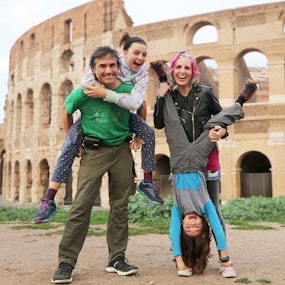
Jessica and Will Suiero
World Towning
Jessica and Will (with their two kids Avalon and Largo), are a family of modern-day travelers and adventurers who are on a mission to change the world, one hometown at a time. They have traveled by foot, RV, backpack, and boat through 70 countries in 7 years. You can follow their adventures on their YouTube channel, World Towning.



























